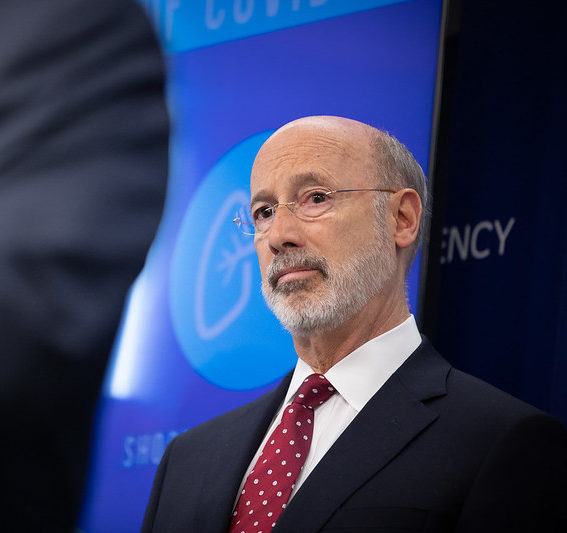Six Democrats, including Delaware Valley state Senator John Kane (D- Chester, Delaware), helped pass a veto-proof bill to stop Gov. Tom Wolf from unilaterally putting Pennsylvania in the controversial Regional Greenhouse Gas Initiative (RGGI). But that hasn’t ended Wolf’s quest to make the Keystone State part of the carbon cap-and-tax program.
Senate Bill 119 would prohibit Pennsylvania’s Department of Environmental Protection from joining RGGI, a regional agreement among Connecticut, Delaware, Maine, Maryland, Massachusetts, New Hampshire, New Jersey, New York, Rhode Island, Vermont, and Virginia. RGGI sets a cap on total carbon dioxide emissions from electric power generators in those states. Generators will purchase credits — effectively a carbon tax — per ton of emissions through auctions.
The U.S. Energy Information Administration reports that in March, the price of those credits hit a record high.
“We need to transition towards an increased reliance on clean and renewable energy — I think we all know that — and I’ve supported legislation to do that,” Kane said. “But I want to make sure there’s a plan in place to support our working people and our working families before we make that transition.
“After bearing the brunt of the pandemic, I want to make sure all our workers are at the center of our economy and our economic transition. ”
“This is a major energy and fiscal policy initiative that, if it is to be imposed, must be approved by the General Assembly,” bill sponsor and state Sen. Joe Pittman (R-Indiana County) told USA Today.
Sen. Judy Ward (R-Blair) believes legislators made the right call in passing SB119.
“Gov. Wolf’s decree that Pennsylvania will join RGGI is yet another example in a long list of unilateral decisions he is making without working with – let alone consulting – the General Assembly,” Ward told DVJournal. “Each and every time he does this our Commonwealth suffers.”
Wolf directed the Department of Environmental Protection in October 2019 to join RGGI, saying it is possible to reduce greenhouse gas emissions and combat climate change while generating economic growth. The directive has caused him to be at odds with legislators ever since. In 2020, the governor vetoed a measure similar to SB119 and even though that bill had support from some Democrats, legislators did not have the necessary votes to override the veto.
“Participating in RGGI will further our commonwealth’s climate goals, mitigate ongoing damage from climate change, and invest in our workforce,” Wolf said this month in a statement published on GoErie.com.
In 2019, after telling the Department of Environmental Protection to join RGGI, Wolf described climate change as the most critical environmental threat confronting the world.
“Power generation is one of the biggest contributors to greenhouse gas emissions,” Wolf said at that time. “Given the urgency of the climate crisis facing Pennsylvania and the entire planet, the commonwealth must continue to take concrete, economically sound, and immediate steps to reduce emissions, (and) joining RGGI will give us that opportunity to better protect the health and safety of our citizens.”
“Studies show joining RGGI will increase family electric bills by 7.8 percent annually,” said Ward in a statement. “Those same sky-rocketing energy costs will cripple the state’s employers, meaning the costs of goods will increase or employers will relocate.”
According to Ward, this “edict” also ignores that RGGI member states have not achieved the level of emission reductions that Pennsylvania has accomplished without joining RGGI.
“To date, it seems Pennsylvania joining this compact only benefits New York, New Jersey, Maryland, and others,” said Ward. “I took an oath to protect the interests of Pennsylvania and my vote to halt this unilateral action does just that while restoring the checks and balances to government, (therefore) the issues raised by this compact must be thoroughly analyzed by the General Assembly, the Public Utility Commission and PJM Interconnection, which coordinates the movement of electricity for 13 states and the District of Columbia.”
SB119 is now before the House where the Environmental Resources and Energy Committee held a related hearing in June.
“The Wolf administration is engaging in fearmongering to drive a political agenda,” Greg Wrightstone, executive director of CO2 Coalition told committee members.
Wrightstone disputed the Department of Environmental Protection’s speculation about future adverse weather resulting from climate change.
Dismissing concerns about flooding, droughts, heatwaves, and other weather events, Wrightstone said Pennsylvania is no different than most of the rest of the globe which he said is “benefiting from a moderate rise in atmospheric carbon dioxide and natural warming.”
“Over the last 50 years there have been increases in the length of growing seasons and crop production and an overall greening of Earth,” said Wrightstone. “Government bodies reviewing RGGI should ‘follow the science’ and reject this economically crippling program.”
Wolf wants to enter the RGGI on January 1, 2022. The Independent Regulatory Review Commission has called for a delay until January 1, 2023. The Commission also directed Pennsylvania’s Environmental Quality Board to explain how it can join the RGGI without legislative approval.

